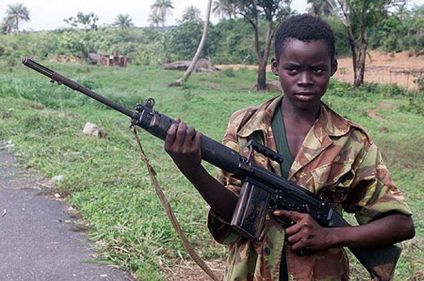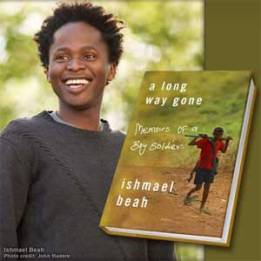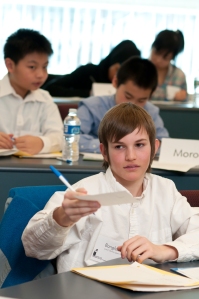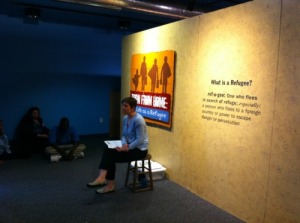Daily Archives: February 13, 2013
Child Soldiers: A disheartening reality
 The disheartening practice of using children as child soldiers is widely practiced in sub-Saharan Africa and in parts of Asia and South America. Currently, there are about 300,000 children involved in conflicts around the world. Most of these boys and girls are forced while others join to escape poverty and abuse or to seek revenge. Those that are forced are often stolen, maimed, drugged, raped, and used as sex slaves.
The disheartening practice of using children as child soldiers is widely practiced in sub-Saharan Africa and in parts of Asia and South America. Currently, there are about 300,000 children involved in conflicts around the world. Most of these boys and girls are forced while others join to escape poverty and abuse or to seek revenge. Those that are forced are often stolen, maimed, drugged, raped, and used as sex slaves.
 Child soldiers are often used to serve government forces and opposition groups. Not only do these children work in the front lines but they also work as messengers and spies. Some even participate in suicide missions. UNICEF defines a child soldier as “any child-boy or girl- under 18 years of age, who is part of any kind of regular or irregular armed force or armed group in any capacity, including, but not limited to: cooks, porters, messengers, and anyone accompanying such groups other than family members. It includes girls and boys recruited for forced sexual purposes and/or forced marriage. The definition, therefore, does not only refer to a child who is carrying, or has carried, weapons.”
Child soldiers are often used to serve government forces and opposition groups. Not only do these children work in the front lines but they also work as messengers and spies. Some even participate in suicide missions. UNICEF defines a child soldier as “any child-boy or girl- under 18 years of age, who is part of any kind of regular or irregular armed force or armed group in any capacity, including, but not limited to: cooks, porters, messengers, and anyone accompanying such groups other than family members. It includes girls and boys recruited for forced sexual purposes and/or forced marriage. The definition, therefore, does not only refer to a child who is carrying, or has carried, weapons.”
 To try to put an end to the recruitment of child soldiers, the Optional Protocol to the Convention on the Rights of the Child on the involvement of children in armed conflict entered and was put into force in 2002. This convention “outlaws the involvement of children under age 18 in hostilities” and requires States “to raise the minimum age for voluntary recruitment beyond the current minimum of 15.” Other efforts include those made by the Statute of the International Criminal Court, which makes it a war crime to enlist children under the age of 15 in hostilities by national armed forces or armed groups.
To try to put an end to the recruitment of child soldiers, the Optional Protocol to the Convention on the Rights of the Child on the involvement of children in armed conflict entered and was put into force in 2002. This convention “outlaws the involvement of children under age 18 in hostilities” and requires States “to raise the minimum age for voluntary recruitment beyond the current minimum of 15.” Other efforts include those made by the Statute of the International Criminal Court, which makes it a war crime to enlist children under the age of 15 in hostilities by national armed forces or armed groups.
 Many other efforts have been made by organizations such as UNICEF and The Romeo Dallaire Child Soldiers Initiative to help put an end to this appalling practice. UNICEF, for example, partners with other NGOS to provide care, technical guidance, and financial support for the implementation of programs for DDR (disarmament, demobilization, reintegration). UNICEF works in places such as the Great Lakes region of Africa, Sierra Leone, Sri Lanka, to name a few. The Romeo Daillaire Initiative, on the other hand, provides research, advocacy, and security sector training. It works directly with military, police, and peacekeeping forces to break the recruitment of child soldiers.
Many other efforts have been made by organizations such as UNICEF and The Romeo Dallaire Child Soldiers Initiative to help put an end to this appalling practice. UNICEF, for example, partners with other NGOS to provide care, technical guidance, and financial support for the implementation of programs for DDR (disarmament, demobilization, reintegration). UNICEF works in places such as the Great Lakes region of Africa, Sierra Leone, Sri Lanka, to name a few. The Romeo Daillaire Initiative, on the other hand, provides research, advocacy, and security sector training. It works directly with military, police, and peacekeeping forces to break the recruitment of child soldiers.
 Ending the use of child soldiers is not an easy task but with such efforts it can eventually be eliminated. Want to learn more about child soldiers? We were inspired to write this blog after hearing a former child solider, Ishmael Beah speak about his experiences. We encourage everyone to read his book “A long way gone: Memoirs of a boy solider” and to check out this website to see how you can get involved: http://www.child-soldiers.org
Ending the use of child soldiers is not an easy task but with such efforts it can eventually be eliminated. Want to learn more about child soldiers? We were inspired to write this blog after hearing a former child solider, Ishmael Beah speak about his experiences. We encourage everyone to read his book “A long way gone: Memoirs of a boy solider” and to check out this website to see how you can get involved: http://www.child-soldiers.org
Beyond the Arab Spring: Struggle for Women Rights Continues
On October 24 the world will celebrate the 66th anniversary of the founding of the  United Nations. As we near this anniversary it is important to revisit the key missions of the United Nations, which centers around finding solutions to critical global challenges.
United Nations. As we near this anniversary it is important to revisit the key missions of the United Nations, which centers around finding solutions to critical global challenges.
In 2010 the Summit on the Millennium Development Goals (MDGs) concluded with the adoption of a global action plan, which laid out Eight Millennium Development Goals, ranging from extreme poverty to halting the spread of HIV/Aids. Another one of the goals that has many ties to the rest is MDG 3, which focuses on Gender Equality. Achieving equal rights for women and girls is a big focus on the global stage currently, and recent headline news reflects this.
Islamic states, Saudi Arabia and Iran have all recently been criticized for their records with women’s rights. In the recent UN Watch Testimony to UN Human Rights, Iran and Saudi Arabia were listed as countries where women are deprived of their human rights.
The legal system of The Islamic Republic of Iran discriminates against women. Similarly, Saudi Arabia is the only country in the world where women cannot drive and women are denied the right to vote and be elected to high political positions. Women, who don’t have the right to drive, however may gain the right to vote.
Recently, Saudi Arabia’s King Abdullah announced women will have the right to vote in local elections in 2015 and become members of the advisory Shura council. Two days after this announcement a court sentenced a woman to 10 whiplashes for violating the kingdom’s religious rules prohibiting women from driving. Usually police stop female drivers, and after they have them sign a pledge not to drive anymore, let them go. This is the first time when legal punishment has been ordered for the violation of driving ban in Saudi Arabia. The court acted after a women’s campaign launched on Facebook and Twitter emboldened by the Arab Spring that inspired women to get behind the wheel and drive. These contradictions are the results of an endless fight between the country’s conservatives and those who want to improve women’s situation.
The issue recalls a long time fight that still continues in Afghanistan. In 1928 King Amanulah and his wife introduced new reforms, which included: the abolition of burqa, mixed schools for boys and girls, and the country’s mullahs. Later, the country’s conservatives and  mujahideen began attacking the government. Presently, the country’s conservatives continue rising up against reforms – which would give basic human rights to women in Afghanistan.
mujahideen began attacking the government. Presently, the country’s conservatives continue rising up against reforms – which would give basic human rights to women in Afghanistan.
The presence of women in Afghan parliament is a show of democracy. In fact, women holding high-ranking political positions do not have the authorities provided by their positions. Women struggle to play a significant political role and they are continually excluded from peace and security processes as well as solving important issues. The most members of the parliament are warlords, the ethnic militias who fought against each other from 1992 to 1996, killing thousands of civilians. Human Rights Watch published a report called “Blood stained Hand” which referred to warlords as “the world’s most serious human rights offenders.”
Now the Afghan government is willing to sacrifice women’s rights in order to compromise with Taliban. According to Oxfam – women’s rights are at risk in Afghanistan. When the international troops withdraw, the government will continue its peace negotiations with Taliban, which will deprive women from some of their basic human rights, which they have regained in the past 10 years with the opening of schools for girls. The spread of insurgency, violence and a corrupted government have left, and will continue to lead, people with no hope of peace.
In Saudi Arabia, the voting rights itself can be a show. The country’s political system is not different from totalitarian regimes that have been overthrown by the  Arab Spring revolution. Saudi Arabia was established in 1932 by King Abd-al-Aziz who united the country under his family’s rule. After his death in 1953 the political power has been in the hands of the royal family and thousands of its princes. For centuries the country has been isolated from the rest of the world and censored by the ruling monarchy. Now, through modern technologies, especially social media, people started have begun to realize that Islam has been used to impose the dynasty’s rules and to exploit the nation’s people.
Arab Spring revolution. Saudi Arabia was established in 1932 by King Abd-al-Aziz who united the country under his family’s rule. After his death in 1953 the political power has been in the hands of the royal family and thousands of its princes. For centuries the country has been isolated from the rest of the world and censored by the ruling monarchy. Now, through modern technologies, especially social media, people started have begun to realize that Islam has been used to impose the dynasty’s rules and to exploit the nation’s people.
The conversation about women’s rights in the Middle East, and throughout the entire globe, is an important one that we need to continue having. Our Women’s Forum focuses on many of these issues and will likely have some events coming up in the spring around women in the Middle East in particular so stay tuned!
In the near time, you can come celebrate the 66th anniversary of the founding of the United Nations with UNA-GB and help  us keep the conversation going. One direct way to do this is to help support the next generation of global leaders learn about these important issues, with the UN Day Model UN mini-simulation at the Massachusetts State House on October 24 -where middle and high school students will debate Gender Inequality focusing on women’s education and employment opportunities worldwide. You can also hear a powerful UN advocate and female leader, Gillian Sorensen speak at our annual UN Day Luncheon on October 28. Tickets are on sale now!
us keep the conversation going. One direct way to do this is to help support the next generation of global leaders learn about these important issues, with the UN Day Model UN mini-simulation at the Massachusetts State House on October 24 -where middle and high school students will debate Gender Inequality focusing on women’s education and employment opportunities worldwide. You can also hear a powerful UN advocate and female leader, Gillian Sorensen speak at our annual UN Day Luncheon on October 28. Tickets are on sale now!
Also, if you are more interested in focusing specifically on women’s equality join our Women’s Forum and come to our many interesting events held throughout the year!
-Muzhgan Rasul
Join UNA-GB’s 66 for 66 Campaign
As world leaders prepare to gather today for the United Nations General Assembly’s opening session, here at UNA-GB a brand new 66 for 66 Campaign has been launched.  In connection with the opening of the 66th session of the General Assembly and in honor of the 66th anniversary of the founding of the United Nations, our campaign focuses on providing 66 Boston-area high school students the unique opportunity to step into the shoes of diplomats at the annual UN Day Model UN Simulation at the Massachusetts State House on October 24.
In connection with the opening of the 66th session of the General Assembly and in honor of the 66th anniversary of the founding of the United Nations, our campaign focuses on providing 66 Boston-area high school students the unique opportunity to step into the shoes of diplomats at the annual UN Day Model UN Simulation at the Massachusetts State House on October 24.
“Now more than ever we need to invest in and nurture the next generation of global leaders” says Jennifer Irizarry, Education Director at UNA-GB. “Unfortunately, too many urban students do not have access to the life-changing resources offered through Model UN, so this campaign allows us to offer more students an opportunity to broaden their perspective, engage in international issues, and build skills that will be critical for college and workplace success.”
UNA-GB’s Model UN program is a college-preparatory program that exposes public school students to the work of the United Nations, the tenets of the Universal Declaration of Human Rights,  and topics such as international economics, development and sustainability, while building leadership and negotiation skills, critical reading and writing ability, and public speaking prowess.
and topics such as international economics, development and sustainability, while building leadership and negotiation skills, critical reading and writing ability, and public speaking prowess.
It only costs $50 to support one student’s participation in a Model UN, so the 66 for 66 Campaign’s total goal is to raise $3,300 to serve 66 students. The campaign will run up through Monday, October 24, when dozens of Boston-area public school students will come together  at the Massachusetts State House in honor of the 66th anniversary of the UN to solve a critical issue in international development. Students representing diverse nations such as Afghanistan, Paraguay, and South Africa will participate in a Model UN simulation to debate solutions to gender inequality and answer the question: Why do global inequalities for women in education and employment persist and what can be done about it?
at the Massachusetts State House in honor of the 66th anniversary of the UN to solve a critical issue in international development. Students representing diverse nations such as Afghanistan, Paraguay, and South Africa will participate in a Model UN simulation to debate solutions to gender inequality and answer the question: Why do global inequalities for women in education and employment persist and what can be done about it?
Want to learn more about and to support the 66 for 66 Campaign? Visit http://ow.ly/6sdrB! And invite your friends and family to join you today in investing in the global leaders of tomorrow!
-UNA-GB Education
Middle School Students Tackle North Korean Aggression Head On!
Two dozen middle school students from the Greater Boston area meet at MCLE in the Disarmament and International Security Committee to debate the international security threat posed by the Democratic People’s Republic of Korea. Representing countries from across the globe (including DPR Korea), the students discussed the human rights violations and nuclear proliferation currently occurring in North Korea. The representative from North Korea denied that any human rights abuses have happened and attempted to justify North Korea’s nuclear proliferation by citing the growing threat from the Republic of Korea and their allies, the United States of America. But, his words fell on deaf ears, and the rest of the committee continued to negotiate to find a solution to North Korean aggression.
By the end of the debate, two distinct proposals were on the floor for a vote. The proposal sponsored by the Russian Federation, Cambodia, the United States of America, and Belgium called for the North Korea government to close down all of their prison camps by 2015, and if they failed to do so, all international aid would be cut. And, although many countries were uneasy about cutting all aid to North Korea, the proposal passed. The second proposal , sponsored by the People’s Republic of China, Pakistan, and Israel, suggested to depose Kim Jong-Il, and hold free and fair elections in North Korea. The delegates of India and Italy were appalled by the idea of the United Nations sanctioning the disposal of an international leader, and the rest of the committee agreed. The proposal did not pass. The students from the British School of Boston, Josiah Quincy Upper School, Macall Middle School, and the Martin Luther King Jr., School all sought to and succeeded in quelling the growing threat of North Korea aggression, at least for the time being.
sponsored by the Russian Federation, Cambodia, the United States of America, and Belgium called for the North Korea government to close down all of their prison camps by 2015, and if they failed to do so, all international aid would be cut. And, although many countries were uneasy about cutting all aid to North Korea, the proposal passed. The second proposal , sponsored by the People’s Republic of China, Pakistan, and Israel, suggested to depose Kim Jong-Il, and hold free and fair elections in North Korea. The delegates of India and Italy were appalled by the idea of the United Nations sanctioning the disposal of an international leader, and the rest of the committee agreed. The proposal did not pass. The students from the British School of Boston, Josiah Quincy Upper School, Macall Middle School, and the Martin Luther King Jr., School all sought to and succeeded in quelling the growing threat of North Korea aggression, at least for the time being.
-Rebecca
A Day as a Refugee: Middle School Simulation
Today, more than 30 million people around the world have been displaced due to war and violence, making nearly 10 million children refugees. As previously blogged about, countries facing an inordinate amount of displaced persons today include Somalia, Colombia, Palestine, Haiti, and Iraq.
On Monday, April 11th, the Education Department of UNA-GB guided a group of participating middle school students from the Greater Boston area through the “Torn from Home: My Life as a Refugee” exhibit at the Boston Children’s Museum. The special event was hosted in commemoration of the 60th anniversary of the 1951 Convention Related to the Status of Refugees. The traveling exhibition provided an interactive second-hand look at the plight of refugees, particularly the children supported by the UN High Commissioner for Refugees (UNHCR).
 The 6th and 7th grade students from Josiah Quincy Upper School came highly prepared for the day’s simulation – when Rachel Farkas, the Asia Program Associate at Boston Children’s Museum, sat down to give a brief introduction of the exhibition, they enthusiastically differentiated between refugees, evacuees, and environmentally displaced people!
The 6th and 7th grade students from Josiah Quincy Upper School came highly prepared for the day’s simulation – when Rachel Farkas, the Asia Program Associate at Boston Children’s Museum, sat down to give a brief introduction of the exhibition, they enthusiastically differentiated between refugees, evacuees, and environmentally displaced people!
To simulate the camp experience, the students were divided into 4 smaller groups: registration, medical, education and home. Through a series of inspiring hands on activities and guided questions from UNA-GB staff, students were able to address a myriad of complicated issues afflicting refugees. Upon ‘registration’, the students were issued individual identification bracelets and compared the food rations of a camp with their diets. In the medical center, they examined malnutrition, disease prevention, water and sanitation. While crammed into a tent, students discussed “What is home?” and “What does home mean to you?”. After exploring the exhibition, they gathered on the benches and mats of the minimalist school area to discuss the opportunities education presents to children in refugee camps and to share what each group had learned from the exhibit.
That afternoon, the students represented different countries associated with the UNHCR. They used their newfound knowledge from the exhibit to fuel a debate of the international issue of Environmentally Displaced People. The success of the day was evident due to the energetic debate amongst the students and the variety of resolutions drafted. To grasp the impact of Model UN simulation, read or watch personal feedback from the students themselves.
Film Festival a Wrap – UN Day on the Horizon!
So for those of you who haven’t been keeping up with the UNA-GB this fall, check out all the coverage regarding our 9th Annual Global Voices Film Festival, including in depth analysis of the films and panelists, as well as photos and participant reflections at our sister blog – Global Voices. The films and panelists were all excellent and quite powerful, and we hope you had a chance to check one (or two or all!) of the films out.
We have now jumped full force into planning our numerous UN Day events, including our Annual Luncheon and the Ceremony at the State House.
Stay tuned for more details on these events and more in the next few days! Exciting things are happening during this beautiful fall month of October. We hope to see you!
-UNAGB Staff
YPIC Annual Meeting
On August 10, Young Professionals for International Cooperation (YPIC), held its annual meeting for 2010. The meeting started off with members and prospective members discussing their personal backgrounds, international experiences and interests over pizza and drinks. With the onset of the meeting, Dan Sullivan, YPIC Chair, gave a brief history of the United Nations and YPIC. He also explained that the goal of YPIC to promote increased awareness of social issues and of the United Nations among those between the ages of 18 and 40.
Other leadership committee members including Nate Tassinari spoke about recent events YPIC has held (the Spring Panel Discussion on Fair Trade) and its next event, Taste of Russia, a dinner at a Russian restaurant in Brookline in mid-September to discuss Russia-related topics and to enjoy great food with YPIC members. Lastly, questions were answered and ideas for next year were discussed.
YPIC welcomes you to become a member, attend events, and apply to join the leadership committee.
For more information on how to get involved with YPIC, check out YPIC’s website, blog and Facebook page! Or just send an e-mail to YPIC@unagb.org with your contact information to receive YPIC event announcements and updates.
-Christina


